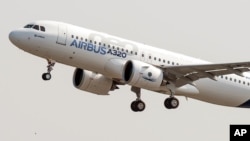Anytime a passenger aircraft goes down, it is world news. But aviation experts say that's a testament to the fact that such disasters happen infrequently.
“Aviation is one of the safest means to get around the world,” said aviation expert Stephen Wright of the University of Leeds.
Tuesday’s crash of the Germanwings Airbus A320 in France has again raised questions about such issues as aircraft maintenance and the safety of low-cost airlines, even though the cause of the crash is not yet known.
Wright said, however, that aircraft manufacturing and maintenance standards are adequate and don’t need to be changed.
"We’re not talking about a small number of aircraft. We’re talking about thousands," he said. "And the manufacturer has a vast data bank of performance." If there were something wrong with the way in which planes were being made or maintained, "the manufacturer would start seeing problems in other aircraft."
At the Institution of Mechanical Engineers in London, air crash specialist Philippa Oldham agrees that there’s no reason to ground the global fleet of more than 6,000 Airbus A320 planes. And she said that's true even though such smaller jets that make short flights go through many takeoff and landing cycles.
“Planes obviously have a finite life cycle, and they’re built to last for a length of time," Oldham said. "However, these planes are exposed to lots of taking off and landing, so potentially lots of shock if, for example, they have a heavy landing. But they’re built to far exceed what they go through.”
Still, Oldham’s organization is advocating the installation of sensors and transmitters to monitor and report the condition of all commercial aircraft in real time, rather than relying on pilot reports and scheduled maintenance.
Unlike most low-cost airlines, Germanwings is wholly owned by a major carrier, Lufthansa, which handles its maintenance and has one of the best reputations in the industry. But Wright said even budget airlines that are strapped for cash can’t cut corners on safety.
“Low-cost carriers don’t have the capability to scrimp on the maintenance," he said. "The maintenance schedule that you perform is initially dictated by the manufacturer. And if you don’t do it, then the local national aviation authority will withdraw your licenses.”
Investigators will be looking at all possible causes of Tuesday’s crash. One theory that has been put forward involves a computer or sensor malfunction of a type that has happened on other flights, but without disastrous results. The head of the air accident investigation center at Britain’s Cranfield University, Graham Braithwaite, said officials would have to guard against drawing conclusions too quickly.
“The danger, and the thing that any disciplined investigator will be very careful to avoid, is suddenly spotting a trend," he said. "Just because an event happened recently, the temptation is to be immediately biased that there’s a trend here. Well, I don’t think that there is. Or if there was, then that is something you need to take proper time to look at."
The high casualty numbers of a commercial air crash, and the tragic stories behind the numbers, make such incidents human dramas that cannot be ignored. But experts say the ensuing concern about flying, and eagerness to know why it happened, should be tempered with patience to get the facts right and the knowledge that air travel is much safer than accidents like this make it appear.




